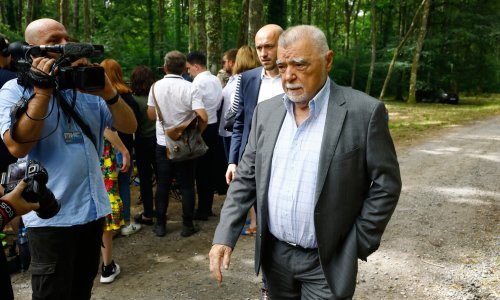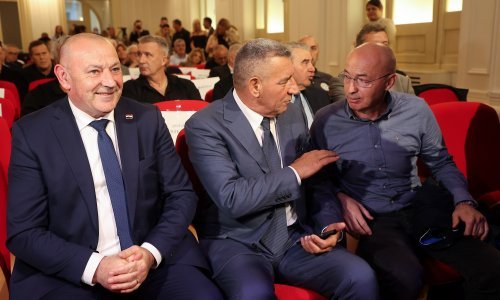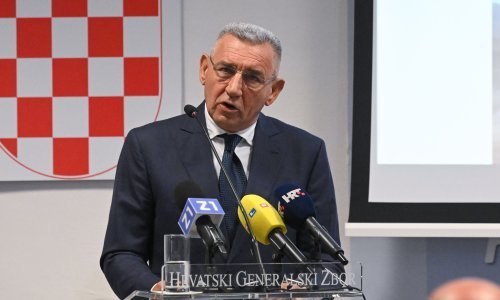In a text published by Novi List daily on Saturday, former Croatian President Stjepan Mesic says that Croatia must understand that the Hague tribunal's verdict against generals Ante Gotovina and Mladen Markac is actually a verdict against Croatia's first president, the late Franjo Tudjman, and his closest associates, and not against Croatia, the Homeland War and the 1995 Operation Storm.
"We should finally understand that the verdict against the generals is actually a verdict against Franjo Tudjman, Gojko Susak and the closest associates of the first Croatian president," Mesic says in the text, among other things.
No political offensive or lobbying campaign aimed at contesting the allegation of a joint criminal enterprise can help Gotovina and Markac, says Mesic, adding that one can help the two generals only with good defence based on contesting their involvement in the implementation of what in the verdict is called a joint criminal enterprise.
"I'm afraid that the generals' defence counsel are not able (or prepared) to do that," Mesic says, claiming that the attempt he launched in his first term in office as President to help organise an interview of Gotovina by investigators of the Hague tribunal - "and I knowingly accepted the political risk that was not insignificant" - failed because of opposition from Gotovina's defence and from "people who are now very vocal in identifying culprits for the Hague verdicts."
"That opposition was motivated exclusively by the wish not to have someone of my profile play any role in finding an acceptable solution," Mesic says, adding that his office at the time collected 5,000-6,000 documents that were in Gotovina's favour.
At the time, General Gotovina showed readiness to make himself available to investigators of the Hague tribunal in Zagreb, as had been done by generals Imra Agotic and Petar Stipetic, and to go to The Hague, should the interview not be satisfactory, Mesic says in the text.
Commenting on claims that the verdict against Gotovina and Markac is actually a verdict against Croatia, the people who defended it, the operations Flash and Storm and the Homeland War, Mesic says that those are lies and that the Hague tribunal was necessary because "there was no political will in Croatia to prosecute war crimes" that undoubtedly were committed by the Croatian side.
There is no doubt whatsoever that the then state leadership knew about the crimes, Mesic says, adding that he was present when a then government minister told Tudjman that Serb villages in western Slavonia "are being set on fire in three shifts," and that an opposition politician said in parliament at the time that the day after the liberation of Knin, all villages in the Knin area were intact, while in the evening that same day they were in flames.
"That is exactly what I have already said: There is no and there was no readiness to face the truth. One would rather accept entire Croatia being held hostage by the few, or by a group, than clear up things once and for all," Mesic says, adding that it was in this context that he advocated the need for full cooperation with the Hague tribunal. Full cooperation with the tribunal enables Croatia to prosecute, on its own, war crimes committed by its forces and helps it "eliminate the smallest possible attempt to construct collective guilt."
Mesic describes as untruths and manipulation claims that he and his office directly delivered Tudjman's transcripts to the Hague tribunal and its prosecution, noting that such allegations are coming "from those who before my election as the head of state removed transcripts that could possibly incriminate them as members of the joint criminal enterprise, or from those who requested that General Gotovina be arrested."
He also describes as a blatant lie the claim that upon beginning his term at the Office of the President he took over all the documentation of his predecessor, noting that those documents, "including the famous transcripts", were kept in different places all over the office.
Mesic says that based on the records he found at the office he was able to establish that Ivan Jarnjak, who at the time was chief of the Office for National Security, had personally read and removed transcripts that he considered interesting, such as minutes of sessions of the Council for Defence and National Security, sessions of the Croatian Democratic Union (HDZ) Presidency, or transcripts of Tudjman's conversations with his closest associates.
A portion of those transcripts, says Mesic, was taken by Vladimir Seks, another portion was taken by Miroslav Tudjman, while a third portion of the transcripts "disappeared in a curious way". The transcripts that disappeared included transcripts of meetings that were attended by Jarnjak and Ivic Pasalic, says Mesic, dismissing claims that all transcripts were in sealed envelopes bearing the sign "Confidential".
Mesic also says that he is not running away from the fact that he made certain documents available to the public, because by doing so, he "made it possible for the true democratisation of the Croatian society to begin." He adds that sensitive documents, like those used by the prosecutors of the Hague tribunal, could have been manipulated before he took up office as President.
Mesic believes that the political scene in Croatia was not prepared for the tribunal's verdict and that its response was immature, and he holds the media responsible for "fomenting tensions directly, openly and in an extremely unethical and unprofessional way."
As for the position of the Church, Mesic says that it contributed to raising tensions by calling for a joint prayer and fasting against an unjust verdict, thus making it known that it had doubts about the Hague tribunal.
He also expresses concern about a drastic decline in public support for Croatia's accession to the EU, which he says is "the best proof of how disoriented and uninformed the Croatian public is at the moment," since "the EU has nothing to do with the Hague tribunal."



































